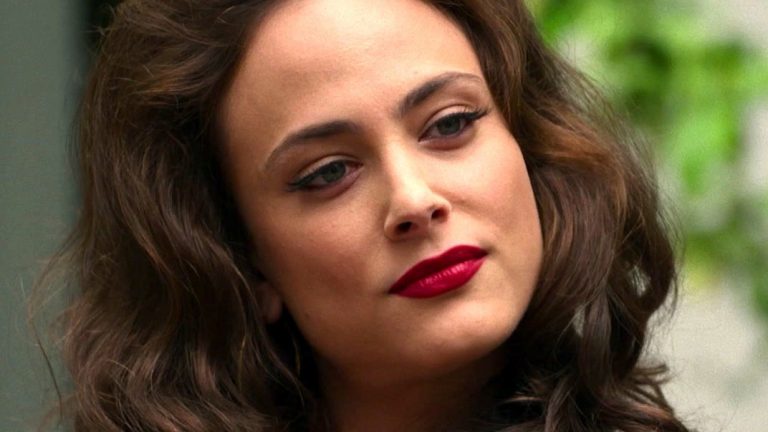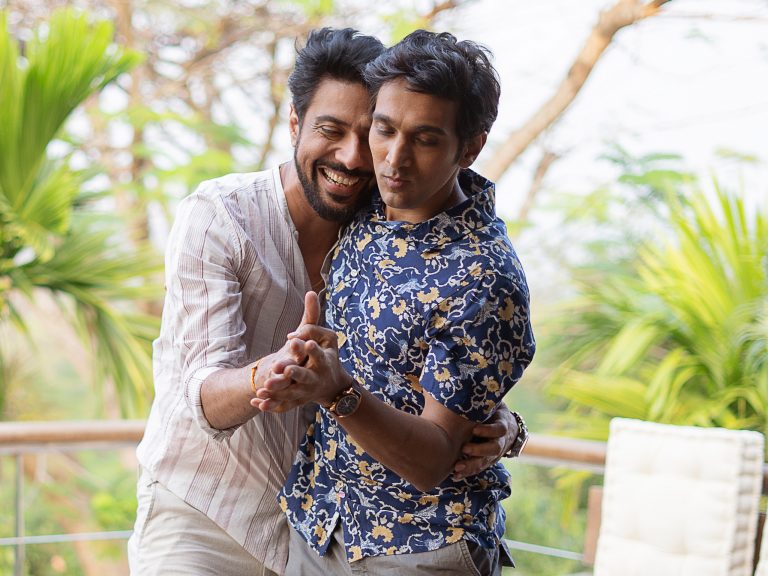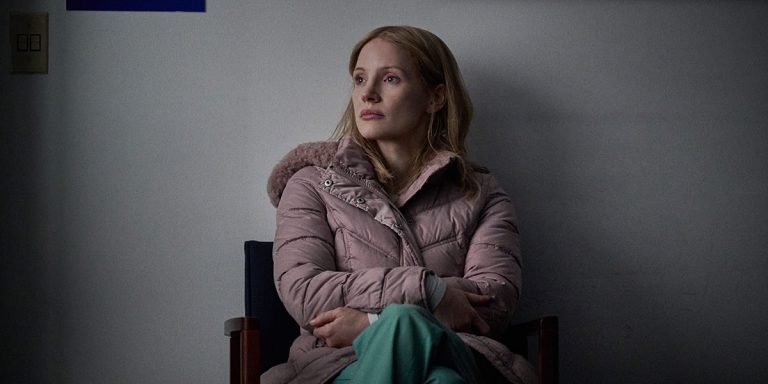Interview With ‘7 Days’ Director Roshan Sethi And Actor Karan Soni: 7 Days (2022), directed by Roshan Sethi and written by Sethi and Karan Soni, follows Rita (Geraldine Viswanathan) and Ravi (Soni) who meet at a pre-arranged date set up by their old-fashioned parents. Since they’ve nothing in common between them, it naturally goes horribly bad. To make things worse, during the date they get the information that the world is shutting down due to the COVID-19 pandemic. With nothing available for transportation or temporary accommodation, Rita is forced to let Ravi live with her until things “get better”. But it doesn’t and the duo has no option but to stop the charades and be honest with each other to get through the claustrophobia-inducing phase.
Watch the Interview with 7 Days Director Roshan Sethi & Star and Co-writer Karan Soni below:
7 Days premiered at the Tribeca Film Festival on June 10, 2021. It went on to win the Best Narrative Feature awards at the San Diego Asian Film Festival and the Coronado Island Film Festival. This month, the team behind the film bagged the award for Best First Feature at the 37th Independent Spirit Awards. So now, ahead of their theatrical release this week, Roshan Sethi and Karan Soni sat down with me (virtually) to talk all about the movie, their personal lives, and more.
Congratulations on winning your Best First Feature award at the Film Independent Awards. It was super fun to see you all exchanging shocked expressions, especially Karan who was absolutely baffled. How did you celebrate the win? And did it involve blasting “Desi Spider-Man” on full volume in any way?
Roshan Sethi (RS): Blast Desi Spider-Man. That’s a good idea!
Karan Soni (KS): That is a good idea. No, we went to an after-party for the IFC, the channel that hosted it, and we went there and we were just in shock! All of us were in shock!
RS: And we’re a couple and we hadn’t seen each other for so long. It had been like five or six weeks. So it was our first day back together after a long distance separation. So, it was really nice to be together on that day.
Your portrayal of arranged marriage in 7 Days was quite different to how it is in real life and especially in India. There’s more focus on the human element rather than on caste, religion, the influence of parents etc. How much of that was a conscious decision?
RS: Well, I think it’s just different in North America where the parents are less concerned with caste and religion even than they are here [in India]. You know, I think many Indian parents, I know my mom, for example, really wanted my brother to marry someone who is also Punjabi. Because we are Punjabi. And then she very quickly let go of that. And now it is like any Indian from any part of India, whatever. So, in North America, I don’t think you can afford to be as picky.
KS: Yeah, there are less options. This whole world was so interesting to me because I grew up in India and we don’t have websites really or when I grew up. And this was happening through him, through family members, and he’s known through Shaadi.com who have met people. It was such an interesting world. They were trying to find certain traditional values but were having a hard time because, you know, people have evolved and changed. So, like with his [Ravi’s] mom, they start with this very strict list and very quickly they are like, “Is she living, breathing, and doesn’t have debt? Just make it work, yeah.”
RS: Yeah, I think it’s just so different over here. So, what we depicted is, I think a pretty accurate version of how arranged marriages or introduced marriages, which is probably the more accurate term, plays out in North America among people of Indian descent.
There’s a renewed sense of skepticism around arranged marriage because of Netflix shows like Indian Matchmaking and The Big Day. But there are people from our or younger generations, like Ravi, who depend on arranged marriages to get a partner. So, do you think 7 Days can serve as a beacon of hope for arranged marriages amidst all this skepticism?
RS: Yeah, I think there are people who need it [arranged marriage]. But I do think in general that it’s meant to show that it’s a perfectly valid way to find a partner and genuine companionship. And it’s meant to offer up a different perspective from most Western rom-coms. The perspective being that love is also something that is practically built between two people and then maintained through caring for the rest of their relationship and the rest of their lives. Which is something I think that we innately know growing up the way we all did but is a little bit further from the Western experience.
KS: We’ve had so many friends who are not Indian who have watched the movie and they were like, “Honestly, this doesn’t look so bad to me.” Because they’re so sick and tired of dating apps. They were like, “I’d love it if someone was like, ‘Here’s this person’, and just try to figure it out.” People say that all the time now.
Something that’s missing from arranged marriages is this period of time where the people who want to get married don’t get to even know who they are in their personal spaces before doing their saat phere? And you really push Rita and Ravi to get personal and look beyond those binaries that society has imposed. So, what was the decision making process behind that theme?
KS: I think it’s a big part of what we’ve been going through with COVID too where we had all these expectations of paths of where our lives would be. And suddenly we were forced to be isolated with other roommates or friends or partners and like my relationship worked when we went to the office, from 9-to-5. But now that our office is in our living room, we can’t stand each other. We were in that period when we wrote that script and we naturally felt like exploring that would feel interesting and good. It also just creatively led to a lot of comedy and drama and all the good things. And we were working with limited circumstances, with COVID, and how many actors we could have, the testing and all that. So, it all naturally fit into the story.
RS: I think we moved in while we were making the movie? Right, because we had just moved in, over the summer.
KS: Yes.
RS: So, it was on our minds.
So, did your personal experiences also bleed into the script?
RS: Yeah! So, Karan is playing a version of himself and Rita is a version of me, in terms of their relationship and ours. But it has changed. Because I was more hard-hearted in the beginning but have grown really tender. And now I am probably the more tender one. So, we switched roles a little bit from the way the movie depicts it.
KS: And you stopped making paintings of vaginas.
RS: I never did that! I never did that! I don’t paint.
That was a real plot twist.
[both laughing]
KS: I know!
RS: It really was. But Karan’s sister painted the real paintings.
Was the ending always meant to be that ambiguous? Or did you have an alternate ending in mind to give the audience some form of closure?
RS: For me, I just feel like the strict narrative rule is that you never show audiences something that they already know is going to happen or can already imagine. Because what you depict is always going to be worse than what exists in people’s heads. All fiction has to leave a little space for people’s imagination. I think once they see each other, they lower their masks, once they stand in proximity to each other, that’s all you need to know about the rest of their lives. Because they are sharing something sweet and magical. So, why ruin it with something as crass as a kiss?
Apart from the final scene of course, the drunken dancing scene is one of the most freeing moments in the movie for the characters who are really wound up till that point. And you even play with some unmotivated lighting choices to accentuate that feeling. So was it as liberating to direct and act in that scene as it is for the audience to watch it?
RS: Well, Karan was drunk. So, I think it was quite liberating.
Actually drunk?
RS: Yeah, actually! And then we were playing Bollywood music. Our favorites. Because we’re both big lovers of Bollywood music. And that song, Desi Spider-Man didn’t exist at that point. It was meant to be ‘Sheila Ki Jawaani’. But we couldn’t convince T-Series to give us the rights because what they asked in terms of licensing was the budget of the movie. Anyways, they danced to a playlist of Bollywood music that I was actually pressing advance on as we were going through it. Because I was the only other Indian person there who could do that. And then we did unmotivated lighting, as you discussed. It was quite wild! And I wondered at that time if this would feel like too much of a departure from reality when this is quite a grounded movie. Because the lights are not just changing in brightness as they go through the song but also change colors, they’re moving in sequence. But it all feels perfectly like being drunk. To me, anyway. To be drunk and dancing.
KS: Yeah, I think we just did one take.
RS: Yeah! We just shot them dancing for four minutes with a hand-held camera and we went through one and a half songs
Also, I can’t thank you enough for including the pots-and-pans banging scene and then call out the stupidity of it. Walk me through how it made its way into the movie.
RS: That was happening in America. People were trying to applaud the efforts of doctors by banging pots out of the windows. So, it just seemed like his character would be a part of that. Because of who he is.
KS: Yeah, he was talking it all too seriously. And sincerely. It also encapsulates where we are time-wise in the pandemic. Obviously it has gone on and on and on. No one is doing that anymore. But in a way it’s like how we all were during that period of time, trying to be like, “How long is this? What are we doing?” Trying to find some purpose and meaning. Trying to feel helpful. So, we sort of worked with all that. And it was great for highlighting the character because his character is doing it and her character is literally walking out the door. And it just shows where they are at mentally at that stage in the movie.
Talking about favorite scenes and since you were talking about Bollywood, as a Shah Rukh Khan fan, it was amazing to watch someone narrate Kal Ho Na Ho so enthusiastically.
KS: I know! But I hope it shows up on his [Shah Rukh Khan’s] radar. Or Karan Johar’s. Or Preity Zinta’s.
I’ll try. I’ll broadcast it on Twitter. So, in addition to that, what are some of the Bollywood movies that you think are like mandatory-viewing-for-all?
KS: Well, I left India in 2007. So, I’ve reduced watching as many Bollywood movies just because they weren’t available as easily. So, for me, I grew up on K3G, Kal Ho Naa Ho…
RS: Dil Toh Paagal Hai. Hum Aapke Hain Koun,
KS: Yeah, movies that I feel that they’re not making that kind anymore? Because, to me, from the outside, it seems like there’s a lot of action. It’s not my favorite.
RS: In recent years, Gully Boy has been a standout.
KS: And we loved Made in Heaven. Which I know is not a movie.
RS: Devdas is really good.
KS: Anything that Zoya Akhtar does is really good. Anything that Alia Bhatt does is really good. We’re like huge fans of Alia Bhatt.
So, you must have checked out Gangubai Kathiawadi (2022)?
RS: Oh! We just watched the trailer! We’re really excited to watch that movie! Because it just looks intense.
Classic Sanjay Leela Bhansali, yeah.
RS: Yeah, it is classic Sanjay Leela. It’s like nobody can do that. Even in the West. Nobody is doing what he does visually, I think. It’s just so amazing.
KS: And then I watched The Fame Game! Our friend created it.
Now that you’ve brought the straight Indian arranged marriage scene into the Hollywood rom-com genre, what other concepts or stories are there that you want to tackle through the Indian perspective that you think needs telling?
RS: Well, we are going to do a Gay Indian rom-com next year, where Karan will play the lead. And I will direct, again.
KS: We’ve a horror idea too that we want to shoot in India, which we are still working on currently.
RS: And one day we’d be so lucky to make a Bollywood movie.
Please do. And you said Indian and horror and I am excited. We need good Indian horror movies.
On a parting note, and I am sure that I am the 100th person to tell you this today Karan, Francis Ford Coppola, has said that and I quote, “I liked Deadpool, I thought it was amazing”. Share your thoughts on that.
KS: Yeah! I just saw that last night! To which I was like, “Wow!” That’s great!
RS: I love when people get to that age. Because they just tell the truth. Just unfiltered. The uninhibited truth.
KS: Yeah, that was really cool.
We should get Francis Ford Coppola for a Dopinder spin-off.
[both laughing]
KS: Yeah!
RS: A sultry, family betrayal kind of Dopinder drama.
KS: That sounds amazing!
RS: That’s a great idea! Generations of Dopinder.


![Lady Boss: The Jackie Collins Story [2021]: ‘Tribeca’ Review – The unapologetic life of a writer](https://79468c92.delivery.rocketcdn.me/wp-content/uploads/2021/06/Lady-Boss-The-Jackie-Collins-Story-1-highonfilms-768x432.png)
![Come Here [2021]: ‘Berlinale’ Review – Vague Thai diversion explores cinema that denies a definition](https://79468c92.delivery.rocketcdn.me/wp-content/uploads/2021/03/Come-Here-1-highonfims-768x576.jpg)
![RRR [2022] Review: S. S. Rajamouli Delivers One Of The Best Indian Action Films With Jr. NTR And Ram Charan](https://79468c92.delivery.rocketcdn.me/wp-content/uploads/2022/03/RRR-1-768x432.jpg)

